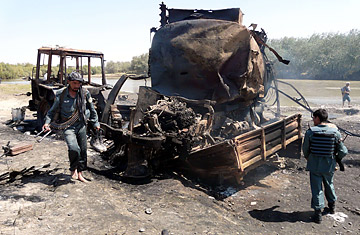
Afghan police inspect the site of an air strike on fuel tankers in Kunduz on Sept. 4, 2009
A devastating air strike ordered by German troops near the Afghan city of Kunduz on Friday, Sept. 4, has unleashed a rancorous political debate over Germany's presence in Afghanistan, just when Chancellor Angela Merkel's coalition government was hoping to keep the unpopular mission out of the campaign for the upcoming federal election. As opposition parties and the public loudly question Germany's military role, Merkel's conservative colleague, Defense Minister Franz Josef Jung, is also in the firing line after initially denying that the air strike had caused any civilian casualties.
On Sunday, Jung's official line was that slightly more than 50 Taliban insurgents were killed in the bombing but that no civilians died. The German government claimed the attack was justified because the Taliban had seized two fuel tankers to launch an attack on German soldiers in Kunduz. "When just 6 km away from us, the Taliban take two fuel tankers, that represents a serious danger for us," Jung said. But on Monday, the Defense Minister backpedaled on his earlier comments and acknowledged that there may have been civilian casualties after all. Jung told the German public television channel ZDF that the "majority [of victims] were Taliban." A spokesman for the Defense Ministry told TIME that the German government would not comment until NATO completes its investigation of the episode.
With the federal election looming on Sept. 27, opposition parties seized on the apparent confusion in Merkel's government and demanded a full inquiry. The defense spokesman for the liberal Free Democratic Party, Rainer Stinner, said he was surprised at the "contradictions in the explanation even three days after the incident." Green Party leader Claudia Roth accused Jung of "intolerably beating about the bush." And the formerly communist Left Party, which is the only party calling for an immediate withdrawal of German troops from Afghanistan, was quick to condemn Friday's bombing. "The death of civilians in an air strike requested by the Bundeswehr [the German army] ... is unjustified and inexcusable," said Gregor Gysi, head of the Left Party's parliamentary group.
There are many unresolved questions over the death toll in the Kunduz attack — and it's still not clear how many civilians were killed. According to Sunday's Washington Post, a NATO fact-finding team estimated that some 125 people were killed, of whom at least two dozen — perhaps many more — were not insurgents. Speaking at a news conference on Sunday, Sept. 6, Merkel was forced onto the defensive. "The situation was complex, and that's why we need a thorough and quick explanation of what took place," she said, referring to NATO's investigation. "If there were civilian victims, I would deeply regret that."
But the fact that the air strike was called in by a German commander has damaged the reputation of Germany's troops in Afghanistan and put paid to the notion that German forces are merely engaged in a reconstruction effort. Over the past few months, German troops based in northern Afghanistan have come under daily attack from Taliban insurgents. And those attacks are becoming increasingly deadly. Germany is the third-largest troop contributor to the NATO-led mission in Afghanistan, behind the U.S. and Britain. Some 4,200 German troops are based around the city of Maza-e-Sharif in northern Afghanistan, which has always been considered relatively peaceful. But recently the region has become a bloody battleground. So far, 35 German soldiers have been killed in the campaign that started in January 2002. Now Germany's politicians and public are being forced to face the fact that, like it or not, their nation is waging a war.
According to recent polls, the majority of Germans are opposed to the Afghan mission and want their troops to be sent home. Scarred by the legacy of World War II, most Germans are skeptical of the increasingly offensive role their country's forces are taking in Afghanistan, and Merkel's government has been criticized for failing to explain to voters the purpose of Germany's Afghan mission. The current parliamentary mandate for the German military deployment in Afghanistan runs out in December; hoping to wait until closer to that time to deal with the controversial issue, the two big parties have steered clear of it during the election campaign. Merkel's Christian Democratic Union party and its coalition partners, the Social Democrats, have not set a date for the withdrawal of German troops from Afghanistan.
Frank-Walter Steinmeier, German Foreign Minister and Merkel's challenger in the upcoming elections, told the Bild am Sonntag newspaper on Sunday, "We and our allies must ensure that the incident in Kunduz is quickly and precisely investigated." But he too refused to put a date on any withdrawal, claiming that doing so would play into the hands of the insurgents.
On Tuesday, Chancellor Merkel is due to address the German parliament to explain the government's Afghanistan strategy and respond to the Kunduz air strike. It's likely she will be in for a rough ride as opposition politicians ratchet up the pressure for an exit from the Hindu Kush.
